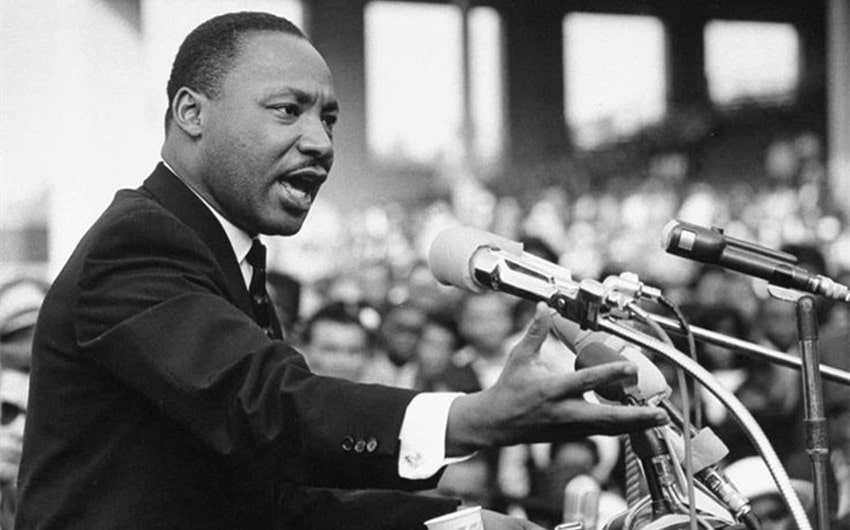10 Iconic MLK Quotes About Justice That Still Resonate Today
Justice is something we all yearn for, whether it’s in our communities, workplaces, or the world at large. Martin Luther King Jr., a voice of courage and wisdom during the Civil Rights Movement, gave us words that continue to guide our paths today.
His speeches and writings are filled with insights on fairness, equality, and the fight against injustice. In this article, we’ll explore some of the most inspiring MLK quotes about justice, offering timeless lessons that resonate deeply with the challenges we face in our daily lives.
Iconic Martin Luther King Jr. Quotes About Justice

Image source: Pinterest
1. “Injustice anywhere is a threat to justice everywhere.”
This powerful statement from Martin Luther King Jr.’s Letter from Birmingham Jail (1963) highlights the interconnectedness of humanity. King believed that injustice in one place affects everyone, as it undermines the foundations of fairness and equality.
This quote serves as a call to action, urging individuals to fight injustice wherever it appears, not just in their immediate surroundings. It reminds us that ignoring the struggles of others allows systemic inequalities to persist and grow, ultimately impacting us all.
2. “The arc of the moral universe is long, but it bends toward justice.”
This quote, often attributed to King but originally from the 19th-century minister Theodore Parker, was famously reiterated by King in his 1968 sermon at the National Cathedral in Washington, D.C. It encapsulates his deep belief in the inevitable triumph of justice, even in the face of adversity.
King used this metaphor to inspire patience and perseverance among his followers, emphasizing that while achieving justice might take time, progress is assured when people remain committed to the cause.
3. “True peace is not merely the absence of tension: it is the presence of justice.”
Also from Letter from Birmingham Jail, this quote challenges the misconception that peace is simply the lack of conflict. For King, true peace could only exist when justice prevails. He argued that suppressing conflict without addressing the underlying injustices only creates a fragile and temporary calm.
This insight encourages individuals and leaders to focus on resolving deep-seated inequalities rather than avoiding uncomfortable conversations or actions.
4. “Law and order exist for the purpose of establishing justice and when they fail in this purpose they become the dangerously structured dams that block the flow of social progress.”
In his book A Gift of Love: Sermons from Strength to Love and Other Preachings (1963), King critiques systems that prioritize maintaining order over achieving justice. He warns that laws and structures meant to serve justice can become obstacles when they perpetuate inequality.
This quote remains relevant in contemporary discussions about systemic racism and the reform of institutions that fail to protect marginalized communities.
5. “Of all the forms of inequality, injustice in health care is the most shocking and inhumane.”
King’s statement on healthcare highlights his broader commitment to equality in all aspects of life. He regarded access to healthcare as a basic human right and believed that denying it to any group is a profound moral failure.
This quote underscores the idea that societal well-being depends on equitable access to essential resources and services, a message that continues to resonate in modern debates about healthcare reform.
6. “Justice too long delayed is justice denied.”
This quote from Letter from Birmingham Jail (1963) emphasizes the urgent need for justice to be timely. King argues that justice postponed loses its meaning because delays allow inequalities and suffering to persist.
For those oppressed, waiting is not a luxury but a prolonged state of injustice. This statement remains relevant in addressing slow progress in legal systems or societal reforms, where immediate action is often necessary to prevent further harm.
7. “One has not only a legal but a moral responsibility to obey just laws. Conversely, one has a moral responsibility to disobey unjust laws.”
Here, King distinguishes between just and unjust laws, urging individuals to critically evaluate the morality of the laws they follow. He believed that unjust laws, which degrade human dignity, should be challenged through nonviolent civil disobedience.
This quote reflects his philosophy of standing up against systems that enforce inequality and inspires action against institutionalized oppression.
8. “Power at its best is love implementing the demands of justice, and justice at its best is power correcting everything that stands against love.”
King connects the concepts of power, love, and justice in this profound statement. He suggests that the most ethical use of power arises when it is guided by love and works toward achieving justice. Conversely, justice reaches its fullest potential when it harnesses power to remove obstacles to love, such as hatred, inequality, and oppression.
This quote challenges the misuse of power for domination or selfish gains, advocating instead for power to be a tool for uplifting humanity. It reflects King’s belief in the harmony between moral strength and the pursuit of equity.
9. “It is not possible to be in favor of justice for some people and not be in favor of justice for all people.”
This quote emphasizes the universal and indivisible nature of justice. King argues that selective support for justice is inherently hypocritical because true justice requires equality for all, regardless of race, gender, class, or any other characteristic.
It calls out those who advocate for fairness only when it benefits them or their community, urging instead a commitment to justice for every individual. King’s words serve as a reminder that solidarity and empathy are essential in creating a just and equitable society, leaving no one excluded from the fight for fairness.
10. “We are determined here in Montgomery to work and fight until justice runs down like water, and righteousness like a mighty stream.”
Drawing from Amos 5:24, King invokes powerful imagery to inspire perseverance in the fight for justice. This declaration during the Montgomery Bus Boycott reflects his deep commitment to equality and his belief in the divine alignment of justice with righteousness. The message encourages collective action and faith in the eventual triumph of moral principles over injustice.
Featured image: Pinterest.com






